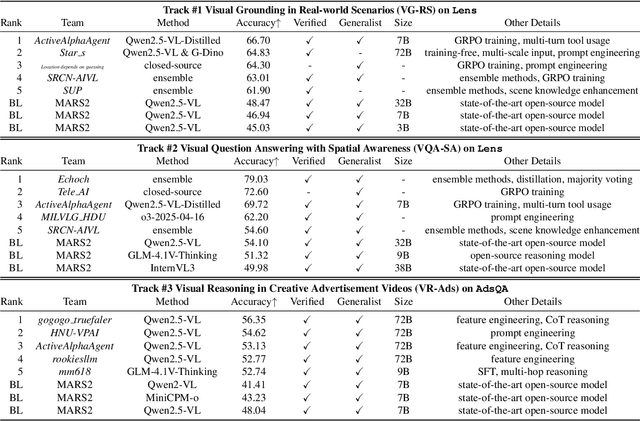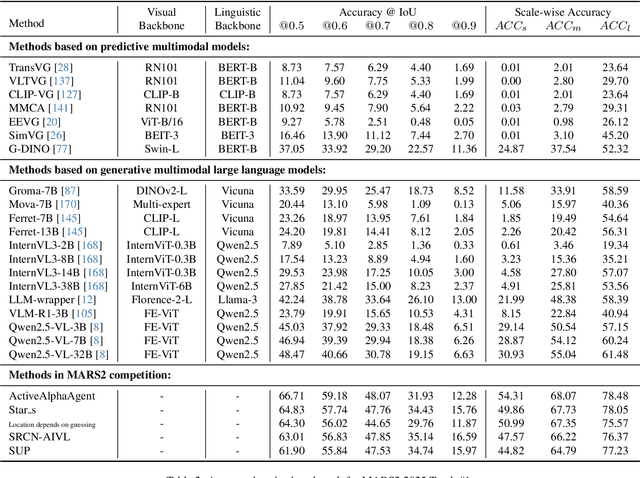Hongyao Chen
MARS2 2025 Challenge on Multimodal Reasoning: Datasets, Methods, Results, Discussion, and Outlook
Sep 17, 2025



Abstract:This paper reviews the MARS2 2025 Challenge on Multimodal Reasoning. We aim to bring together different approaches in multimodal machine learning and LLMs via a large benchmark. We hope it better allows researchers to follow the state-of-the-art in this very dynamic area. Meanwhile, a growing number of testbeds have boosted the evolution of general-purpose large language models. Thus, this year's MARS2 focuses on real-world and specialized scenarios to broaden the multimodal reasoning applications of MLLMs. Our organizing team released two tailored datasets Lens and AdsQA as test sets, which support general reasoning in 12 daily scenarios and domain-specific reasoning in advertisement videos, respectively. We evaluated 40+ baselines that include both generalist MLLMs and task-specific models, and opened up three competition tracks, i.e., Visual Grounding in Real-world Scenarios (VG-RS), Visual Question Answering with Spatial Awareness (VQA-SA), and Visual Reasoning in Creative Advertisement Videos (VR-Ads). Finally, 76 teams from the renowned academic and industrial institutions have registered and 40+ valid submissions (out of 1200+) have been included in our ranking lists. Our datasets, code sets (40+ baselines and 15+ participants' methods), and rankings are publicly available on the MARS2 workshop website and our GitHub organization page https://github.com/mars2workshop/, where our updates and announcements of upcoming events will be continuously provided.
Hybrid Batch Normalisation: Resolving the Dilemma of Batch Normalisation in Federated Learning
May 28, 2025Abstract:Batch Normalisation (BN) is widely used in conventional deep neural network training to harmonise the input-output distributions for each batch of data. However, federated learning, a distributed learning paradigm, faces the challenge of dealing with non-independent and identically distributed data among the client nodes. Due to the lack of a coherent methodology for updating BN statistical parameters, standard BN degrades the federated learning performance. To this end, it is urgent to explore an alternative normalisation solution for federated learning. In this work, we resolve the dilemma of the BN layer in federated learning by developing a customised normalisation approach, Hybrid Batch Normalisation (HBN). HBN separates the update of statistical parameters (i.e. , means and variances used for evaluation) from that of learnable parameters (i.e. , parameters that require gradient updates), obtaining unbiased estimates of global statistical parameters in distributed scenarios. In contrast with the existing solutions, we emphasise the supportive power of global statistics for federated learning. The HBN layer introduces a learnable hybrid distribution factor, allowing each computing node to adaptively mix the statistical parameters of the current batch with the global statistics. Our HBN can serve as a powerful plugin to advance federated learning performance. It reflects promising merits across a wide range of federated learning settings, especially for small batch sizes and heterogeneous data.
 Add to Chrome
Add to Chrome Add to Firefox
Add to Firefox Add to Edge
Add to Edge